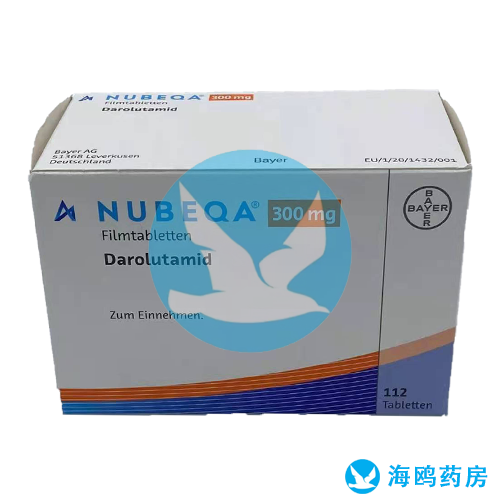Significant OS Boost Seen With Darolutamide Plus ADT in Metastatic Castration-Sensitive Prostate Cancer
Patient with metastatic castration-sensitive prostate cancer (CSPC) treated with androgen deprivation therapy (ADT) and docetaxel experienced better survival with the addition of darolutamide (Nubeqa) vs placebo, according to results of the ARASENS trial (NCT02799602) that were reported at the 2022 Genitourinary Cancers Symposium.1

At a median follow-up of 43.7 months for darolutamide and 42.4 months with placebo, the active therapy resulted in a 32.5% reduction in the risk of death (HR 0.68, 95% CI 0.57–0.80; P< .001). The results of the trial were simultaneously published in the New England Journal of Medicine.2
“Darolutamide improved overall survival [OS] despite a high rate of subsequent life prolonging systemic therapies in the placebo group,” Matthew R. Smith, MD, PhD, director of the Genitourinary Malignancies Program at Massachusetts General Hospital and professor of medicine at Harvard Medical School, said during a presentation of the data. “The overall survival benefit for darolutamide was consistent across prespecified subgroups.”
Darolutamide is a structurally distinct and highly potent androgen receptor (AR) inhibitor that was previously approved to treat patients with castration-resistant prostate cancer (CRPC) in the nonmetastatic setting based on results of the phase 3 ARAMIS trial (NCT02200614).3 Data from the study showed a statistically significant improvement in metastasis-free survival with the agent against matched placebo.
In ARASENS, patients with cytologically confirmed metastatic adenocarcinoma of the prostate were eligible for the trial. All participants needed to be candidates for ADT and docetaxel, have an ECOG performance status of 0 or 1, and have adequate organ function.
Patients were randomized 1:1 to either 600 mg of daily darolutamide (n = 651) or matched placebo (n = 655) plus ADT/docetaxel. Factors for stratification included extent of disease (M1b/b/c) and alkaline phosphatase (ALP) levels. The primary end point was OS with secondary outcome measures of time to CRPC, time to pain progression, time for first symptomatic skeletal event (SSE), time to initiation of subsequent systemic antineoplastic therapy, and safety.
Patient characteristics were well balanced between the 2 groups. The median age was 67 years for both the darolutamide and placebo groups and most patients had a Gleason score of 8 or greater (77.6% vs 78.9%, respectively) and M1 stage (85.7% vs 86.5%) at initial diagnosis. At initial screening, patients in both groups were most likely to have M1b stage disease (79.4% vs 79.5%) and ALP levels equal to or above the upper limit of normal (55.5% each).
Median OS in the darolutamide arm was not estimable (NE; 95% CI, NE-NE) vs 48.9 months (95% CI, 44.4-NE) with placebo. Rates of OS at 48 months were 62.7% and 50.4%, respectively. The effect of active therapy was consistent across patient subgroups, including by ALP level below (HR, 0.64; 95% CI, 0.46-0.88) or above the upper limit of normal (HR, 0.69; 95% CI, 0.56-0.85), and by either de novo (HR, 0.71; 95% CI, 0.59-0.85) or recurrent (HR, 0.61; 95% CI, 0.35-1.05) metastatic disease status.
Moreover, darolutamide was associated with superior secondary outcomes despite patients in this arm receiving fewer subsequent life-prolonging systemic antineoplastic therapies (56.8%) vs the placebo arm (75.6%). Common subsequent therapies included abiraterone acetate (35.6% vs 46.9%), enzalutamide (Xtandi; 15.2% vs 27.5%), cabazitaxel (Jevtana; 18.1% vs 18.0%), and docetaxel (14.6% vs 18.0%). Notably, 66% of patients in the placebo arm went on to receive life-prolonging therapy with an AR pathway inhibitor. Time to first subsequent antineoplastic therapy was NE (95% CI, NE-NE) in the active therapy arm vs 25.3 months (95% CI, 23.1-28.8) in the placebo group (HR, 0.39; 95% CI, 0.33-0.46; P <.001).
A significant delay in time to castration-resistant disease was noted in the darolutamide vs placebo groups, at NE (95% CI, NE-NE) vs 19.1 months (95% CI, 16.5-21.8), respectively (HR, 0.36; 95% CI, 0.30-0.42; P <.001). Darolutamide was also associated with increased time to pain progression at NE (95% CI, 30.5-NE) vs 27.5 months (95% CI, 22.0-36.1) with placebo (HR, 0.79; 95% CI, 0.66-0.95; P = .01). Time to first SSE was NE in both arms, but statistically significant benefit with the darolutamide combination was noted (HR, 0.71; 95% CI, 0.54-0.94; P = .02).
Rates of treatment-emergent adverse events (AEs) were similar between arms, at 99.5% with the darolutamide regimen and 98.9% with placebo. “Consistent with prior clinical experience in other settings, darolutamide had a favorable safety profile. The rates of any treatment-emergent adverse event, serious adverse event, and adverse events leading to permanent discontinuation of study treatment were similar between the darolutamide and the placebo groups,” Smith said.
Grade 3/4 AEs occurring with darolutamide and placebo included neutropenia (33.7% vs 34.2%, respectively), febrile neutropenia (7.8% vs 7.4%), hypertension (6.4% vs 3.2%), and anemia (4.8% vs 5.1%). After adjusting for differences in drug exposure, the was no difference in the occurrence of AEs of special interest for AR pathway inhibitors between groups, including events such as fatigue, bone fractures, rash, falls, hypertension, and cardiac disorders.
“Based on the results of ARASENS, we conclude that darolutamide in combination with ADT and docetaxel should become a new standard of care for the treatment of patients with [metastatic CSPC],” Smith concluded.
References
Smith MR, Hussain MHA, Saad F, et al. Overall survival with darolutamide versus placebo in combination with androgen-deprivation therapy and docetaxel for metastatic hormone-sensitive prostate cancer in the phase 3 ARASENS trial. J Clin Oncol. 2022;40(suppl 6):abstr 13. doi: 10.1200/JCO.2022.40.6_suppl.013
Smith MR, Hussain MHA, Saad F, et al. Darolutamide and survival in metastatic, hormone-sensitive prostate cancer. N Engl J Med. Published online February 17, 2022. doi: 10.1056/NEJMoa2119115
FDA approves darolutamide for non-metastatic castration-resistant prostate cancer. FDA. July 30, 2019. Accessed February 17, 2022. https://bit.ly/3JDxm26
https://www.cancernetwork.com/view/significant-os-boost-seen-with-darolutamide-plus-adt-in-metastatic-castration-sensitive-prostate-cancer
Disclaimer:《Significant OS Boost Seen With Darolutamide Plus ADT in Metastatic Castration-Sensitive Prostate Cancer》Edited and sorted by Seagull Pharmacy's editors. Please contact us in time if there is any infringement. In addition, the suggestions for drug usage, dosage and disease mentioned in the article are only for medical staff's reference, and can not be used as any basis for medication!